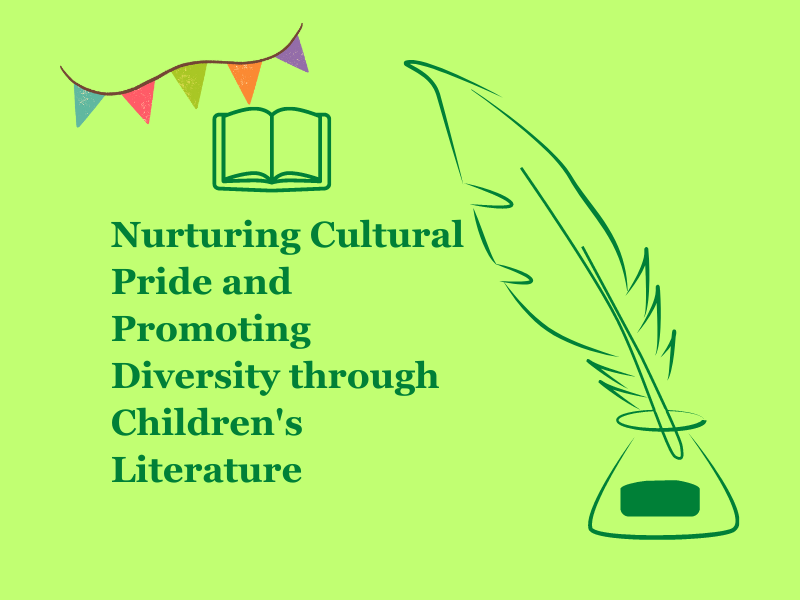In today’s diverse and interconnected world, it is crucial to celebrate and embrace ethnic traditions to foster cultural pride and promote diversity. Children’s literature serves as a powerful medium to showcase and honour the richness of ethnic traditions. It enables young readers to develop an appreciation for different cultures. In this article, we explore the significance of celebrating ethnic traditions in children’s literature and how it contributes to fostering cultural understanding, promoting inclusivity, and shaping young minds with a global perspective.
The Importance of Representation
Representation matters in children’s literature. Celebrating ethnic traditions in storytelling allows children from various backgrounds to see themselves reflected in the books they read. It validates their experiences, instils a sense of belonging, and nurtures cultural pride.
Promoting Cultural Diversity
Promoting cultural diversity is essential in fostering a more inclusive and interconnected society. By incorporating ethnic traditions into children’s literature, we create opportunities for young readers to explore a rich tapestry of cultural practices, customs, languages, and beliefs. Through these stories, children are exposed to the diverse ways in which people around the world celebrate, communicate, and understand the world. This exposure not only cultivates an appreciation for different cultures but also instils a sense of curiosity and open-mindedness. This prepares children to embrace and respect the vibrant diversity that exists within our global community.
Fostering Empathy and Understanding
Children’s literature holds immense power in shaping young minds and promoting empathy and understanding. When stories celebrate ethnic traditions, they create a gateway for young readers to experience life through the eyes of characters from diverse cultural backgrounds. This immersive experience allows children to develop empathy and relate to the challenges, joys, and experiences of others. By stepping into these different shoes, children gain a deeper appreciation for the diversity of human experiences. It fosters a sense of connection and compassion towards people from different cultures. Through these stories, children learn the importance of embracing and respecting different perspectives, laying the foundation for a more empathetic and inclusive society.
Preserving Cultural Heritage
Preserving cultural heritage is crucial for maintaining the richness and diversity of our world. By celebrating ethnic traditions in children’s literature, we use stories as vehicles to pass down traditional practices, folklore, and customs to future generations. It safeguards cultural identity and prevents the loss of knowledge and wisdom from previous generations. This preservation of cultural heritage serves as a protective shield against cultural erosion. This allows children to connect with their roots, understand their cultural identity, and appreciate the unique contributions of their ancestors. Through these stories, cultural heritage becomes a living legacy. Therefore, it fosters a sense of pride and continuity in the cultural tapestry of society.
Breaking Stereotypes and Challenging Bias
Children’s literature can challenge stereotypes and biases by showcasing the depth and complexity of ethnic traditions. Through authentic portrayals, these stories counter misconceptions, promoting a more accurate understanding of different cultures and dismantling prejudices.
Developing Cultural Curiosity
Stories that celebrate ethnic traditions ignite curiosity in young minds. They inspire children to ask questions, explore different cultures, and seek out further knowledge about traditions. It will help in fostering a lifelong appreciation for cultural diversity and global interconnectedness. In short, it increases observation and analysis skills.
Nurturing Cultural Pride
Children’s literature has the remarkable ability to nurture cultural pride by celebrating ethnic traditions. Through stories that honour diverse cultures, children develop a deep sense of pride in their own heritage and an appreciation for the richness of other cultures. These stories help children understand and value their cultural roots, fostering a strong sense of identity and self-esteem. By seeing themselves represented and learning about the traditions and customs of their own culture, children gain a deeper connection to their heritage, empowering them to embrace and celebrate their cultural identity with confidence and joy.
Promoting Intercultural Connections
By showcasing ethnic traditions in children’s literature, we promote intercultural connections. These stories enable children to recognize the shared humanity and universal values that exist across cultures, fostering a sense of unity and global citizenship.
Encouraging Inclusivity and Acceptance
Stories celebrating ethnic traditions promote inclusivity and acceptance by highlighting the beauty and significance of diverse cultures. They teach children to appreciate differences, respect other cultures, and embrace the richness that diversity brings to our world.
Inspiring Multilingualism and Language Learning
Children’s literature that celebrates ethnic traditions often incorporates native languages and encourages multilingualism. By exposing young readers to different languages, these stories inspire language learning, cultural exploration, and a deeper understanding of diverse linguistic heritages.
Conclusion
In conclusion, celebrating ethnic traditions in children’s literature is of utmost importance in fostering cultural pride. It promotes diversity and nurtures empathy and understanding. By embracing the richness of ethnic traditions, children’s literature becomes a powerful tool for shaping young minds with a global perspective, fostering inclusivity, and preparing future generations to embrace the beauty and diversity of our interconnected world. Therefore, let us continue to celebrate ethnic traditions in children’s literature, creating a literary landscape that reflects the mosaic of human experiences and nurtures a generation of culturally aware and compassionate individuals.

